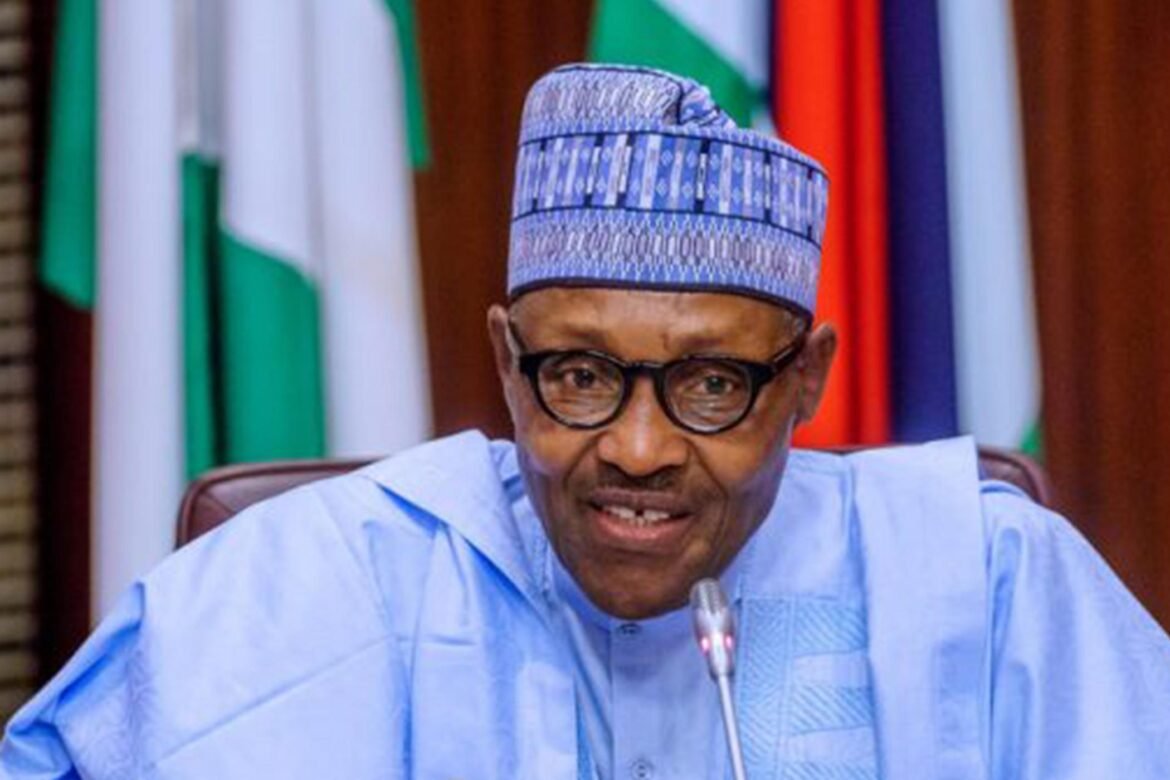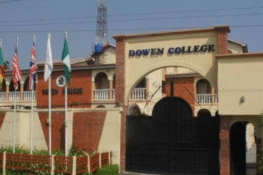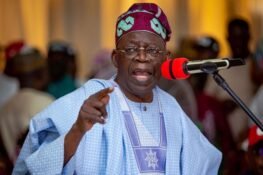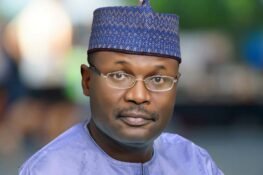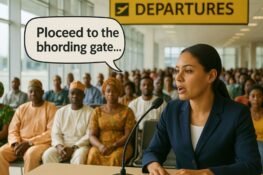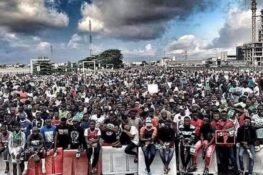Is Olusegun Obasanjo a Nigerian or an African statesman?
This is something that matters to him.
To truly be either, he has to have inspired hope for the future of both his country and the African continent.
Nowadays though, he mostly warns about doom and gloom.
Still, the former Nigerian president has never been shy to delve into the political crises of a number of countries, particularly in West Africa when trouble comes calling.
After exiting the presidency back in 2007, he found a new purpose in promoting good governance on the continent.
His new found occupation also offered his successors the opportunity to keep him distracted.
But to continue playing the role of an African statesman, he needs the support of whoever occupies Nigeria’s presidency.
And in recent years, that has been undercut by President Muhammadu Buhari.
But bigger political forces at play in the West African subregion are also pushing Obasanjo into silence.
It is becoming fashionable for leaders in the region to review their countries’ constitutions allowing them to stay in power beyond two terms.
Obasanjo had the perfect resume to speak on democracy in Africa.
As a military leader, he organised Nigeria’s first elections in close a decade and a half and presided over a military to civilian transition process.
This earned him the admiration of the international community.
Two decades later, he was himself elected president, becoming the first in the country to successfully complete two terms in office.
Then, he blew all away, almost instantly tainting three decades of building an international profile as a statesman, by trying but failing to amend his country’s constitution so as to stay in power for more than two terms.
But apart from the instability being fuelled by the desire of certain leaders to remain in office, Buhari in recent times has shown more interest in the elections of members states of ECOWAS
And when he was about to leave, Obasanjo, not the Independent National Electoral Commission (INEC), declared Umaru Yar’Adua winner of the 2007 presidential election.
The electoral commission just followed his lead.
In 2020, it isn’t just that Obasanjo, normally very vocal, is silent in these trying times, other leaders, it seems, have learnt from his mistakes and perfected the art of constitutional reviews.
What Obasanjo could not do, President Faure Gnassingbe of Togo did with ease in 2019, changing his country’s law to allow him contest for two more terms of five years each.
This, after already spending 15 years in power.
A failed boycott of parliamentary election by the opposition gave the Togolese president total control of parliament, paving the way for the constitutional changes.
In February 2020, he got his wish and was elected for another term.
And he still has another to go in 2025.
But political discontent is simmering.
A similar scenario is playing out in Ivory Coast where President Alassane Ouattara is ploughing ahead with plans to run for a third term in office despite questions on the constitutionality of the move.
Mass protests over his plans have already led to several deaths.
And elections in Ivory Coast are not only contentious, they have a historical tendency of slipping into violence and civil unrest.
A third president in the West African subregion also has plans to contest elections beyond two terms.
President Alpha Conde of Guinea is running for a third term in the October election after winning a referendum to change the country’s constitution back in March.
Again, like in Togo, the opposition miscalculated by choosing the boycott the referendum and giving Conde a 91.6 per cent approval for the changes.
Resistance to these developing trends is coming from the most unexpected place, Nigeria’s President Buhari.
If you are a leader in Africa, there couldn’t be a better time to make these constitutional changes.
Across the other side of the world, the present occupant of the White House has shown no particular interest in promoting democracy or even the rule of law in Africa or selling it to the rest of the world.
In fact, the last four years has witnessed the resurgence of the strongman leader, from Hungary to the Philippines.
Nigeria’s president, Muhammadu Buhari is not an obvious candidate to push for political stability on the African continent by means of the ballot box.
His image for a long time has been one of an autocrat.
In the mid 80s, he came to power through the barrel of the gun and even after being elected as president back in 2015, many have remained distrustful of his democratic credentials.
Over and over, he has insisted that his ways have changed.
It is typical for us in Nigeria not to pay attention to all that is happening around us and across our borders, even when political events are leading insecurity in the entire West Africa region.
The increasing desire by a number ECOWAS leaders to cling to power is exacerbating the security challenges and fuelling political instability.
The attitude of most Nigerians is like having your neighbours house on fire and thinking your own house is safe.
But apart from the instability being fuelled by the desire of certain leaders to remain in office, Buhari in recent times has shown more interest in the elections of members states of ECOWAS.
It could be because the presidents of these countries themselves seek out the Nigerian president in Aso Rock right before heading into scheduled elections in their respective countries.
Under Buhari, Nigeria has become more engaged in the security challenges in West Africa, becoming a focal point in the coup and political impasse in Mali and now the push to strengthen democratic processes
Considering Nigeria’s place in West Africa, it is no coincidence that Buhari has found himself taking centre stage in advocating for political stability and ensuring elections are credible.
And it is precisely because of Nigeria’s influence that the president’s recent call, earlier this month at the 57th ordinary summit of ECOWAS in Niamey, Niger to leaders of the region to adhere to the constitutional provisions of their countries on term limit would have come as an admonition to both Guinea’s Alpha Conde and Alassane Ouattara of Ivory Coast.
Under Buhari, Nigeria has become more engaged in the security challenges in West Africa, becoming a focal point in the coup and political impasse in Mali and now the push to strengthen democratic processes.
In 2020, after Togo, at least five more countries within the subregion are scheduled to hold presidential elections, including Ghana, Ivory Coast, Burkina Faso, Guinea and Niger.
The elections are coming at a time when the world appears to be losing interest in the security and political stability of West Africa.
That leaves members states of the region body with the most to lose when elections don’t hold, are manipulated or are so contentious, that they lead to political instability, spilling over to neighbouring states.
But why should Nigeria care what is happening in Togo or Guinea? And what will be Buhari’s gain in speaking out?
It’s a question Nigerians have asked about every former that has sought to once again get elected as president; what did he forget in Aso Rock that he wants to go back?
Ibrahim Babangida left in unflattering circumstances.
And for a long time afterwards, he had ideas of once again bearing the title president, only this time, as an elected leader.
Olusegun Obasanjo got in his way.
But he did forget something, his image; that of a military president that annulled Nigeria’s freest and fairest election back in 1993.
Unfortunately, he is still being haunted by one of his very last acts before stepping aside.
But like Obasanjo, Buhari has gotten his own second chance to remake his image.
For many leaders, it is just as crucial to build a legacy on the international stage as it is locally.
Decades from now, for Buhari to be remembered as a champion of democracy in West Africa, on May 29, 2023; he has to hand over power, not to the candidate of his choice, but one that was freely elected by all Nigerians in a fair and credible process.
From his recent utterings and the outcome of the election in Edo, he might do just that.
And if you are a politician from the East, West or North, there may be no better time to run for president than 2023.
